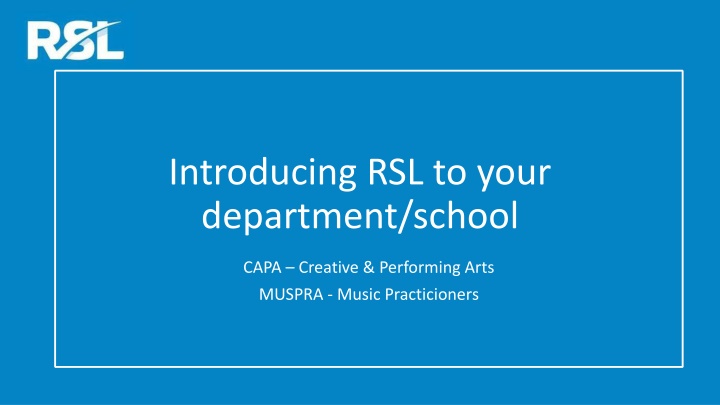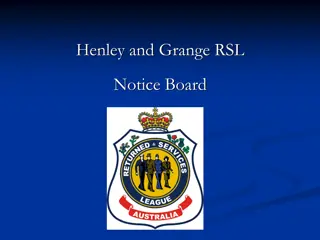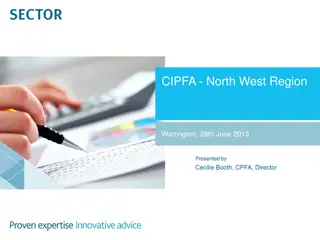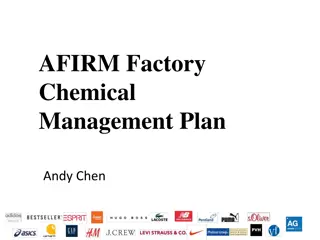
Revolutionizing Arts Education with RSL: A Path to Innovation
Discover how transitioning to RSL (Rockschool London) can enhance teaching experiences and inspire students in the realm of Performing Arts. Explore the benefits of RSL vocational qualifications in nurturing artistic talents and preparing students for successful careers in music, theater, and dance.
Download Presentation

Please find below an Image/Link to download the presentation.
The content on the website is provided AS IS for your information and personal use only. It may not be sold, licensed, or shared on other websites without obtaining consent from the author. If you encounter any issues during the download, it is possible that the publisher has removed the file from their server.
You are allowed to download the files provided on this website for personal or commercial use, subject to the condition that they are used lawfully. All files are the property of their respective owners.
The content on the website is provided AS IS for your information and personal use only. It may not be sold, licensed, or shared on other websites without obtaining consent from the author.
E N D
Presentation Transcript
Introducing RSL to your department/school CAPA Creative & Performing Arts MUSPRA - Music Practicioners
Welcome, esteemed Performing Arts educators! In the dynamic realm of music and performing arts, change is not just inevitable but essential for growth. As professionals who have dedicated their careers to nurturing artistic talents, it's natural to feel a sense of attachment to a familiar exam board. However, the transition to RSL (Rockschool London) is not just a change; it's an exciting evolution in the ever-evolving landscape of arts education. RSL stands at the forefront of the industry, constantly adapting to the pulse of contemporary music and performing arts. This transition isn't about abandoning the past; it's about embracing a future that is vibrant, relevant, and filled with new possibilities. RSL empowers educators by offering flexibility and autonomy in teaching, acknowledging the unique strengths of each teacher and student. Join us on this journey as we explore how the switch to RSL can enhance your teaching experience and inspire your students to reach new heights. Let's dispel any hesitations or apprehensions and embark on a path that celebrates innovation and artistic excellence.
Firstly, what made me go looking for an alternative? In my quest for an examination board that aligns with the dynamic needs of our students in the Performing Arts, I encountered numerous challenges with traditional boards such as AQA and EDEXCEL. The frustration of waiting for responses to emails or phone calls, coupled with the inconsistency of contact persons, led me to question the effectiveness of our existing examination process. The theoretical weight of both the Music and Drama GCSE and A Level courses left me disheartened, particularly as they each neglect the essential practical elements vital for preparing students for a career in the Performing Arts. This disillusionment, combined with the realisation that traditional routes were insufficient in providing meaningful performance opportunities, drove me to seek alternatives. The BTEC in Performing Arts, while a commendable option, felt limited and one-dimensional. My search persisted until I uncovered RSL s Vocational Qualifications that not only addressed the needs of both my Music and Drama & Theatre Studies students but also promised industry relevance. This discovery marked a turning point a chance for me, as an experienced educator, to actively contribute to shaping a curriculum that prioritises the best interests of our aspiring musicians, technicians, actors and dancers.
If you are not yet prepared for a full commitment but are interested in exploring the merits of RSL vocational qualifications, consider a trial implementation within your educational setting. Prior to transitioning my International School from traditional Music GCSE and Drama GCSE to the Level 2 Certificate in MUSPRA (Music Practitioners) and the Level 2 Certificate in CAPA (Creative & Performing Arts), our institution encouraged a preliminary trial outside of the formal curriculum. In response, I initiated the introduction of both courses to Year 10 students through an after-school club, meeting twice a week for two hours each session. With the streamlined structure of these Level 2 certificate courses, encompassing only two units for completion, I anticipated a successful implementation within a single academic year. This trial period served as a valuable precursor to the potential integration of RSL vocational qualifications into our mainstream curriculum, allowing for a comprehensive assessment of its suitability and benefits for both educators and students alike. The trial proved so successful that after the academic year the decision was made to officially swap exam boards in both Music GCSE and Drama GCSE to RSL. The Level 2 Certificate in MUSPRA (Music Practitioners) not only accommodated musicians but also opened avenues for non-musicians with an interest in podcast creation and music appraisal. Simultaneously, the Level 2 Certificate in CAPA (Creative & Performing Arts) presented an expansive array of performance opportunities, allowing students to explore and showcase their artistic talents in a diverse range of contexts. The success of this transition underscores the adaptability and enrichment that RSL vocational qualifications bring to our academic programs.
During my initial four years at an International British Curriculum School, my focus was on delivering Music A Level and Drama & Theatre Studies A Level, concurrently offering Level 3 Music Practitioners (MUSPRA) and Level 3 Creative & Performing Arts (CAPA) as entirely separate courses. Over this period, a trend emerged in the diminishing enrolment for traditional A Levels, notably in Music A Level where the course's practical grading and theoretical demands created an unintended elitist dynamic. Simultaneously, the Level 3 Music Practitioners students engaged in immersive experiences, recording albums in a professional studio and acquiring skills in music production, while A Level Drama & Theatre Studies students began recognising a disparity between their curriculum and the dynamic Level 3 CAPA course. While A level students were immersed in traditional academia, writing weekly 1000-word essays on theatre practitioners and outdated scripts, their Level 3 CAPA counterparts were actively involved in screen acting, green screen technology, advert creation, and directing short films. The alluring performance opportunities, ranging from live acting in diverse styles to creative endeavours with limitless options tailored to each learner, highlighted the increasing gap between traditional A levels and RSL vocational qualifications. The undeniable shift was reflected in student enrolment numbers and subsequent success stories, with alumni gaining admission to prestigious Music Conservatoires and Acting Schools globally, a testament to the practical exposure and genuine passion fostered by RSL qualifications. After four years of careful observation, the decision was made to discontinue traditional A Levels in Music and Drama & Theatre Studies. This transition lifted a weight off our academic approach, affording a renewed sense of joy as an educator, fully supported in teaching courses that seamlessly blend theoretical knowledge with practical, industry-relevant experiences.
If my journey and the challenges I navigated with traditional GCSEs and A Levels in Music and Drama & Theatre Studies resonate with your own experiences, I invite you to consider the transformative potential that RSL's Level 2 and Level 3 courses in MUSPRA and CAPA can offer. A start-up pack awaits, providing a solid foundation for you to embark on a teaching path infused with genuine excitement and passion once more. Embracing change is a profound act, and with RSL, rest assured that you're not alone. Behind every email or phone call seeking assistance from RSL is a friendly and authentic individual ready to support you. Personally, I've been fortunate to work with the same dedicated person at RSL for 11 years, a testament to the enduring partnership and collaborative spirit that defines the RSL experience. Here's to a future of inspired teaching, shared successes, and the joy that comes with cultivating the next generation of passionate performers.



